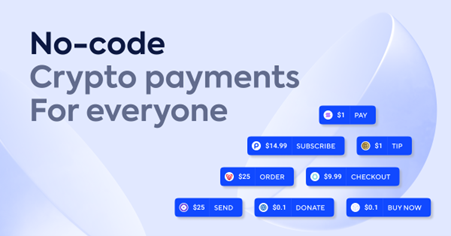Blockchain technology and cryptocurrencies can make a big difference for content creators globally. Anyone can benefit from integrating such solutions, preferably if they do not require coding knowledge. The PIP button may be the answer to many prayers, as it is compatible with any platform or website.
The PIP Button Changes The Game
Pip, but people behind the PIP button, have come up with a way to let anyone integrate crypto and blockchain payments. More importantly, it does not require any coding knowledge to make the most of this solution, which is compatible with any website or platform. The PIP button is compatible with WordPress, Instagram, HTML pages, Javascript, Wix, Squarespace, etc.
In essence, it brings frictionless crypto payments to any content creator worldwide. For creators, it helps establish a new revenue stream for unique content or goods, removing the need for complex payment setups. Consumers benefit from the PIP button as well, as they can pay who they want, how they want, and from which device they want.
Integrating the PIP button also means users do not need user accounts or signups, as the solution is frictionless. Combined with the customization options for this button, it changes the narrative of online payments in many ways. Content consumers have a new way of rewarding content creators with the help of blockchain technology and without requiring vast technical knowledge.
A Strong Foundation For Global Payments
In the current form, the PIP button supports Solana tokens and transactions. Supported assets include SOL. USDC on Solana, PIP, SERUM, RAY, etc. Users will need to set up a wallet through Phantom or Slope to generate their Solana blockchain wallet address, which can be connected to the PIP button to receive transactions. Support for blockchains beyond Solana will follow in future updates.
Unlike networks like Ethereum, Solana is far more efficient for developers and users alike. It has a higher throughput and lower transaction fees, enabling solutions like the PIP button to come to fruition. Building a similar solution on Ethereum would be too expensive for all users involved, which is counterproductive to the idea of enabling smaller transactions globally.
As the global focus shifts to Web3 and the creator economy, solutions like these highlight the potential of blockchain technology and cryptocurrency. Millions of users can pay for creative content through a non-invasive means and without sharing sensitive personal or financial information. Moreover, it empowers the individual – both consumer and creator – at every turn.








